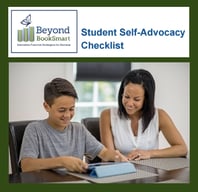Opportunities for learning are everywhere — both inside and outside of the classroom. As parents,  coaches, and teachers, we want our students to be able to take advantage of these opportunities. Part of that objective is to support them to be effective advocates for their own learning. My three-year old son is pretty good at this. If he needs help, he will take my hand and lead me somewhere (to the cookie jar), ask for “assistance” (yes, he really uses this word, especially when trying to jump out of his car seat to the ground), or sometimes say, “Momma do it!” (turn on the television). Whatever his method, I understand that he wants help with something.
coaches, and teachers, we want our students to be able to take advantage of these opportunities. Part of that objective is to support them to be effective advocates for their own learning. My three-year old son is pretty good at this. If he needs help, he will take my hand and lead me somewhere (to the cookie jar), ask for “assistance” (yes, he really uses this word, especially when trying to jump out of his car seat to the ground), or sometimes say, “Momma do it!” (turn on the television). Whatever his method, I understand that he wants help with something.
Interestingly, the easy clarity of asking for help becomes muddy as little ones grow up and enter structured school settings. This is especially true for those I see who struggle with Executive Function skills. Children, teens, and college students who are introverted or have difficulty organizing, planning, and using self-advocacy skills often have so much to gain from 1:1 time with instructors but could benefit from a little exploration of the why and how behind it all.
Why won't students ask for help?
As an Executive Function coach with over ten years experience teaching and advising in college settings, I see that many students don’t take advantage of their instructors as resources for learning.
Why do students struggle with asking for and receiving help? Whether it is visiting a teacher during a free period in middle school or high school or attending office hours in college, the themes are the same. Some students don’t think they need help - that everything is fine - even when objective assessments (for example, grades on exams or papers) suggest otherwise. Even when students agree they need help, some feel embarrassed or ashamed to ask for what they need. But more times than not, the reasons are connected to their difficulties organizing course materials, having limited insight into their own strengths and challenges, and feeling overwhelmed as to how to even start a conversation.
Questions to ask students to help build self-awareness
Sometimes it can be challenging to figure out what the hold-up is regarding accessing help. To gauge where students are in this, open-ended reflective questions that address common themes can be helpful. Asking these types of questions can build meta-cognitive and self-regulation skills that frequently underlie many Executive Function areas. Some ideas include:
- How do you think you are doing (in a specific class, this semester, etc.)? How does this compare to graded work so far?
- Where do you think you could improve? Why? What do you think might help you make progress? Why?
- What are your goals for learning (in this class, this semester, etc.)? Why are these important to you? How could meeting with your teacher help these goals?
- How could learning more about this (topic, class, etc.) help with your current interests (hobby, career path, etc.)?
- How does asking for help in class feel different (or the same) as seeing a teacher 1:1? What would help you work through some of those feelings?
Brainstorming why meeting with teachers can be helpful
These two questions may be especially difficult for students to answer:
- Why do you think your instructor holds office hours or that your teacher is available after school for meeting with students?
- In what ways might it be helpful to meet?
If you're seeing that your student can't readily answer those questions, consider showing these possibilities below. Ask if there is anything here that may be useful - chances are there may be one or more - and these ideas can spark a student's own reasons.
- Prepare better for the next class meeting.
- Clarify concepts that are unclear. (After all, instructors are usually experts in something!)
- Verify knowledge before assessment (prior to submitting assignments, taking quizzes/exams).
- Practice participation by presenting ideas or asking questions in a smaller group than class.
- Enhance relationships with instructors. You never know how this could help! (For example, getting to know instructors can make it easier to ask for reference letters, research assistantships, or other opportunities.)
How to prepare for a meeting with a teacher
Once the reasons for accessing help are clearer, then a trusted adult can help support effective use of office hours to support learning. Perhaps start by asking an open-ending question such as: What do you think you could do to prepare to attend office hours? Some ideas if you are met with “I don’t know” (or a blank stare) are:
- Logistics: Consider the student’s goals and the teacher's schedule—this might take some planning and several steps: How are office hours accessed? Is there a website, portal, or syllabus with this information? If there are appointment or drop-in options, what are the pros and cons of both? Are there any prior commitments (e.g., class, job, after school activities) that conflict with a teacher's availability? Usually this can be worked out with communicating—help the student propose several options that could work and see if the teacher can be flexible.
- Divide and conquer: Support the student to separate out what is known well versus what the student is struggling to learn; write out into two columns; try to make connections between the columns before seeking help; and then ask for 1:1 guidance. Suggest that they show this to their teacher in order to make their learning process transparent.
- Review for mastery: Suggest that the student re-do items on assignments/quizzes/tests scored incorrectly, then use office hours to check this work or to help get “unstuck” if confused about where to start.
- Make connections: Suggest the student read ahead in course materials; try to make connections to material already presented; and then bring those ideas to office hours for discussion. Support the student to use 1:1 time with a teacher to ask how topics they are learning now relate to the next course, a major, an interest, academic/career pathways, etc.
- Challenge and verify: Challenge the student to consider how to verify learned materials with the instructor. See if the student can suggest new examples or applications and see if they are on the right track. Even if the new ideas are a bit off the mark, students may learn something about how to approach the material from a different perspective.
Learning to ask for help and preparing to receive effective help can be a challenging process. Many adults even have trouble! Hopefully, the tips I've shared here will help. And of course, if you ever need a reminder of how natural asking for help can be, try putting a cookie out of reach of a three-year old!
Photo by Mimi Thian on Unsplash
 Download our list of 9 specific self-advocacy skills that students need to master for success in school (and beyond).
Download our list of 9 specific self-advocacy skills that students need to master for success in school (and beyond).

